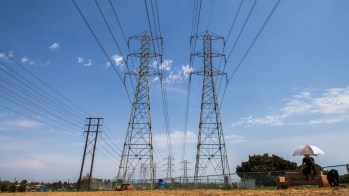Sue the banks
TEXT OF COMMENTARY
Tess Vigeland: As we mentioned earlier, the Supreme Court issued a ruling today that makes it tougher for investors to go after companies accused of fraud. Well next week, the Court may decide whether to hear another case involving Enron shareholders. They’re trying to sue the banks that helped the energy company work its numbers magic.
Opponents of the suit, including President Bush, argue the federal government should be solely responsible for going after the banks. Commentator Jamie Court says the private market provides the best path to justice.
Jamie Court: OK, let’s say you’ve been swindled. Who are you going to trust to get your money back — Uncle Sam or private plaintiffs’ attorneys?
Well, President Bush said he would count on SEC attorneys to recover Enron shareholders’ dough. That’s why the White House isn’t asking the Supreme Court to let victims of stock fraud at Enron, or any other company, sue the bankers that hid the sham transactions.
Headline: “Bush To Nation, Government Does Better Job Than Private Enterprise System.” Hmmm.
Well, the SEC regulators who deal with this every day want the Supremes to let Enron victims directly sue Enron bankers. Why? Government lawyers know the most efficient way for swindled shareholders to get their money back is through private litigation, not government lawsuits.
Just look at the Enron recovery. Total SEC fines collected from Enron and its bankers? Less than a half billion dollars — little more than 1 percent of the $40 billion loss.
By contrast, private plaintiffs’ attorneys have settled more than $7 billion in civil cases from a handful of banks, including JP Morgan, Bank of America and Citigroup. More banks will pay if the Supreme Court decision is in favor of shareholders after a lower court blocked their right to sue bankers.
The problem in relying on government lawyers is they don’t make any money off shareholder lawsuits. And they might want to go to work for those banks in the end, so why tick them off? Private lawyers can get a nice percentage of the take. Government prosecutors are also often more interested in making a name for themselves by jailing swindlers, rather than returning dollars to the swindled.
I know the Supreme Court is never swayed by ideology. That’s why I hope in this case, it declares the free market the fairest and most efficient way for shareholders to get their due.
Vigeland: Jamie Court is president of the Foundation for Taxpayer and Consumer Rights.
There’s a lot happening in the world. Through it all, Marketplace is here for you.
You rely on Marketplace to break down the world’s events and tell you how it affects you in a fact-based, approachable way. We rely on your financial support to keep making that possible.
Your donation today powers the independent journalism that you rely on. For just $5/month, you can help sustain Marketplace so we can keep reporting on the things that matter to you.
















